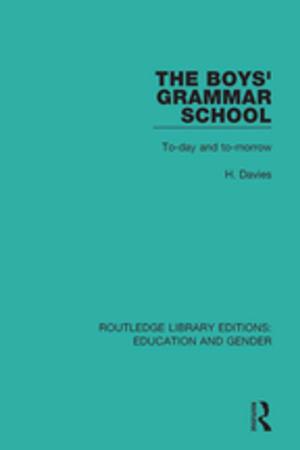Jung and his Mystics
In the end it all comes to nothing
Nonfiction, Religion & Spirituality, Eastern Religions, General Eastern Religions, Health & Well Being, Psychology| Author: | John P. Dourley | ISBN: | 9781317750031 |
| Publisher: | Taylor and Francis | Publication: | April 3, 2014 |
| Imprint: | Routledge | Language: | English |
| Author: | John P. Dourley |
| ISBN: | 9781317750031 |
| Publisher: | Taylor and Francis |
| Publication: | April 3, 2014 |
| Imprint: | Routledge |
| Language: | English |
Jung’s psychology describes the origin of the Gods and their religions in terms of the impact of archetypal powers on consciousness. For Jung this impact is the basis of the numinous, the experience of the divine in nature and in human nature. His psychology, while possessed of a certain claim to science, is based on depths of subjective experience which transcends psychology and science as ordinarily understood. Jung and his Mystics: In the end it all comes to nothing examines the mythic nature of Jung’s psychology and thought, and demonstrates the influence of mysticism and certain religious thinkers in formulating his own work.
John P. Dourley explores the influence of Mechthild of Magdeburg and fellow mystics/Beguines, and traces the mystic impulse and its expression through Meister Eckhat and Jacob Boehme to Hegel in the nineteenth century. All of these mystics were of the apophatic school and understood the culmination of their experience to lie in an identity with divinity in a nothingness beyond all form, formal expression or immediate activity. Dourleyshows how this is still of relevance in our lives today. The book concludes that Jung’s understanding of mysticism could greatly alleviate the conflict between faiths, religious or political, by drawing attention to their common origin in the depths of the human.
Jung and his Mystics: In the end it all comes to nothing is aimed at scholars and senior research students in Jungian Studies, including religionists, theologians and philosophers of religion, especially those with an interest in mysticism. It will also be essential reading for those interested in the connection between religious and psychological experience.
Jung’s psychology describes the origin of the Gods and their religions in terms of the impact of archetypal powers on consciousness. For Jung this impact is the basis of the numinous, the experience of the divine in nature and in human nature. His psychology, while possessed of a certain claim to science, is based on depths of subjective experience which transcends psychology and science as ordinarily understood. Jung and his Mystics: In the end it all comes to nothing examines the mythic nature of Jung’s psychology and thought, and demonstrates the influence of mysticism and certain religious thinkers in formulating his own work.
John P. Dourley explores the influence of Mechthild of Magdeburg and fellow mystics/Beguines, and traces the mystic impulse and its expression through Meister Eckhat and Jacob Boehme to Hegel in the nineteenth century. All of these mystics were of the apophatic school and understood the culmination of their experience to lie in an identity with divinity in a nothingness beyond all form, formal expression or immediate activity. Dourleyshows how this is still of relevance in our lives today. The book concludes that Jung’s understanding of mysticism could greatly alleviate the conflict between faiths, religious or political, by drawing attention to their common origin in the depths of the human.
Jung and his Mystics: In the end it all comes to nothing is aimed at scholars and senior research students in Jungian Studies, including religionists, theologians and philosophers of religion, especially those with an interest in mysticism. It will also be essential reading for those interested in the connection between religious and psychological experience.















